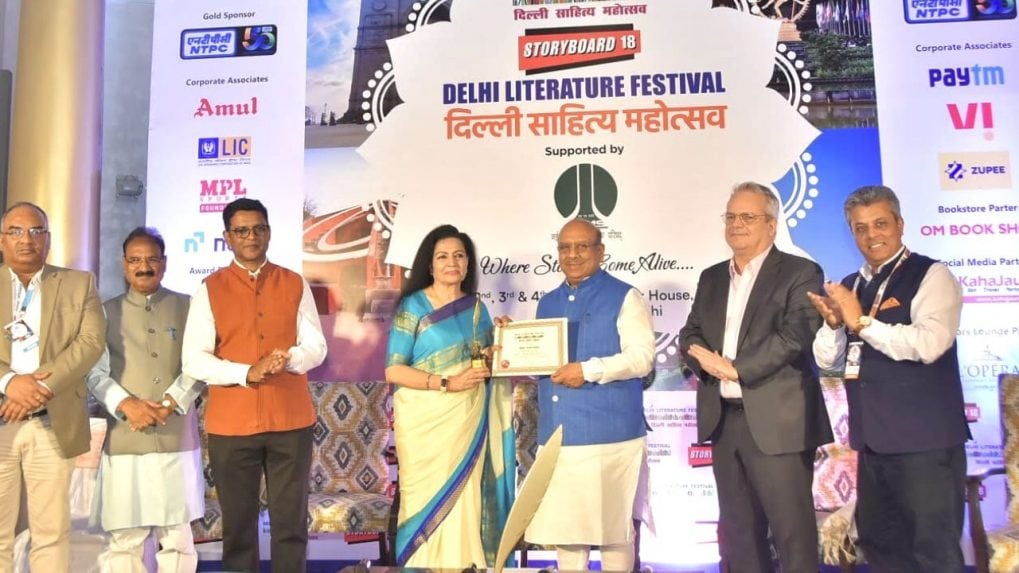Literary luminaries, diplomats, and policymakers gather for Delhi Literature Festival
The Storyboard18 Delhi Literature Festival opened with a dynamic blend of literary discourse, cultural reflection, and policy dialogue, drawing prominent authors, diplomats, and public figures in the capital.
ADVERTISEMENT
Against the backdrop of the bustling capital, a confluence of authors, thinkers, and officials convened on Friday for the opening of the Storyboard18 Delhi Literature Festival, a three-day celebration of literature, heritage, and policy discourse.
Inaugurated by Delhi Assembly Speaker Vijender Gupta, the festival aims to spotlight the cultural and intellectual forces shaping contemporary India. “Literature is a voice that has a direct connection with the soul,” Mr. Gupta remarked, underlining the festival’s commitment to preserving the country’s artistic and cultural legacy.
The opening day featured a wide array of discussions, from heritage preservation in the digital age to India’s evolving foreign policy and its aspirations on the global stage. In an early panel titled “Delhi as an Art, Cultural, and Heritage Hub: Role of Social Media,” historian and author Swapna Liddle offered a cautionary perspective. While social media has broadened access to historical narratives, she argued, it often privileges visual aesthetics over substance.
“Pretty images dominate,” she said, warning that such portrayals can detract from more meaningful engagement with neglected or decaying heritage structures. She questioned whether modern beautification efforts — such as illuminating historic landmarks like the Qutub Minar — are undertaken with due regard for preservation.
Others offered a more optimistic view. Author Anuradha Jain described social media as “immersive” and praised its potential to galvanize community involvement in heritage conservation. Instagram influencer Sukneett Wadhwa, known online as Cocoqueen, shared that the platform had allowed her to recast Delhi as a “more open, vibrant, and exciting” place. “I can tell a 3,000-word story in just 30 seconds,” she said.
Mural artist Sneha Chakraborty also emphasized social media’s power to elevate artistic expression, while Keshav Chandra, Chairman of the New Delhi Municipal Council, called for deeper integration of art forms — including photography and puppet shows — into public spaces. He also urged greater recognition for literary works in regional languages. “There are numerous writers who have authored beautiful books, but in regional languages. Such talents should be recognized,” he said.
The festival drew a distinguished roster of guests, including Tim Curtis, Director and Representative of UNESCO India, foreign policy expert Harsh V. Pant, and former diplomats Amarendra Khatua and Anil Trigunayat. In one session, author Arun Anand spoke on the ideology and objectives of the Rashtriya Swayamsevak Sangh (RSS), coinciding with the release of his new book Janiye Sangh Ko.
An awards ceremony capped the day’s proceedings, recognizing excellence across literary categories. Lakshmi Puri received honors for fiction for her novel The Swallowing Sun, while India on the Move by Marya Shakeel and Narendra Nath was recognized in the nonfiction category. Rashmi Narzary (The Whistles of the Siphoong) and D. Subbarao (Just a Mercenary?) were honored for short stories and autobiography, respectively. Noted author Kamlakant Tripathi received a Lifetime Achievement Award, while celebrated children’s writer Ruskin Bond was honored for The Hoopoe on the Lawn.
Foreign policy and trade also featured prominently. Economist Sanjeev Sanyal addressed the implications of the U.S. tariff regime on India, asserting that Indian exports have largely escaped the brunt of protectionist measures. “On a net basis, India is not severely affected,” he said. He added that the government was focused on forging bilateral trade deals, rather than relying on outdated multilateral frameworks.
Panelists including Khatua and Trigunayat echoed the sentiment that India must navigate a shifting global landscape. Khatua outlined a three-pronged strategic vision for Indian diplomacy — short-term stability, mid-term development goals by 2047, and long-term leadership ambitions. Trigunayat emphasized the need for both military and soft power in response to the “collapse” of the old global order. “The world is witnessing a wave of unilateralism,” he said.
Harsh V. Pant described the global system as being in flux, suggesting India could play a pivotal role in shaping the emerging world order.
The closing panel on the day explored India’s Middle East strategy. Aishwarya Pandit, author of Indian Renaissance: The Modi Decade, praised Prime Minister Narendra Modi’s country-specific approach in the region. “The Arab world is not a monolith,” she noted. “Understanding these divisions is essential.”
Joining her, Bharatiya Janata Party spokesperson Sudesh Verma highlighted the government's civilizational narrative and inclusivity. He characterized the current era as a cultural renaissance. “In India, there is freedom to practice and propagate religion,” he said. “This is a march of civilization, not a march of any one faith.”


